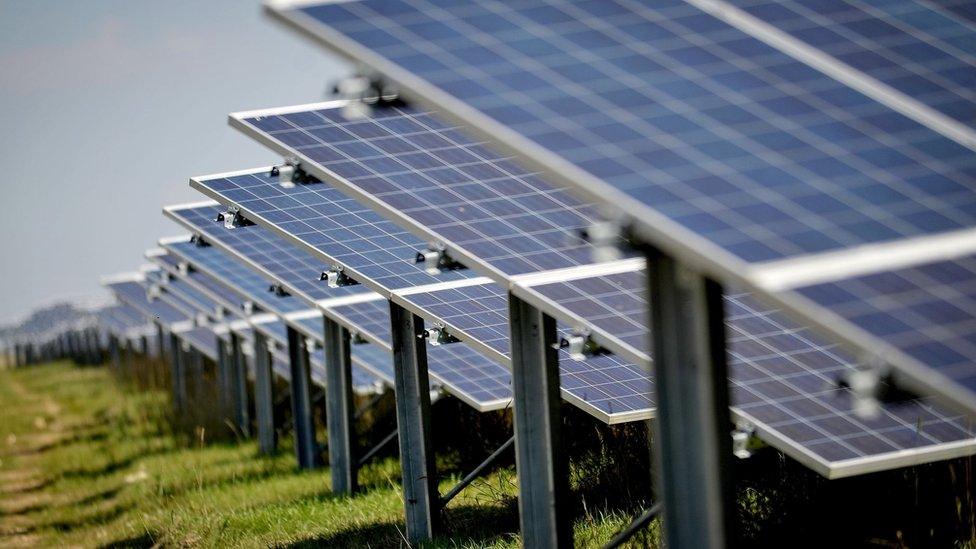Unilever questions government cuts to green energy support
- Published
- comments
The chief executive of Unilever questions the UK government's policy to make cuts to support green energy.
It has been a controversy that has rumbled on for months.
The government has said it wants to cut subsidies to solar and wind power generation, saying it is "on track" to exceed its 2013/14 renewable energy target of 5.4% of all annual energy provision.
The solar power industry is not exactly delighted.
Jobs have been lost as companies have scrambled to cut costs and the sector has complained that the government is sending an inconsistent message on its support.
It appears they have found something of an ally in Paul Polman, chief executive of Unilever, the consumer goods giant (and maker of everything from Marmite to Domestos) that many agree has taken a leading position in the carbon reduction debate.
Unilever recently announced, external it wanted to be "carbon positive" - that is, generating all of its energy from renewable sources with capacity to spare - by 2030.
Without business action, Mr Polman argues, climate change targets will never be met.
But it needs support from government, and that is where the concern lies.
'Wrong signal'
"In the UK, the government has just committed £5.8bn to the climate resilience fund [to help poorer nations most affected by global warming] and also [said it would] stick to the 0.7% of GDP for development aid at the same time," Mr Polman told me.
"So there are some positive things coming out of the UK in terms of helping on this conversion [to a lower carbon world].
"But there are also some areas where I would expect the UK obviously to be a little bit more progressive, for example the risk of reducing the subsidies for wind or solar would send the wrong signal at this point in time."
I said to Mr Polman that appeared to be exactly what the government was doing.
"Well, if it was my choice, I'd be very careful about that," he answered.
Because that could send the wrong message?
"I wouldn't do it at this point in time if it was my choice - but obviously this is a free democracy and everybody else has a voice as well."

'Committed to a global deal'
Chief executives always get a little nervous when it comes to intervening in policy debates.
Amber Rudd, the energy secretary, argues that one of most cost-effective ways of reducing carbon emissions is by replacing coal-fired power stations with gas.
And that the renewables sector has to realise it is not the government's only priority and that budgets are limited.
"We need to focus on the right solutions to deliver clean, secure, affordable energy for families and businesses," a spokesman for the energy department said.
"We are absolutely committed to getting a global deal in Paris, which will create a level playing field for businesses, driving innovation and growing the low carbon economy."
Mr Polman agrees that government budgets are stretched in a number of different directions and not only concerned with tackling climate change.
"In an overall budget you obviously have to balance all these things," he said.
"You cannot discuss one little element if you don't see the totality, so I'm very glad that the £5.8bn is being pledged because that gives a great signal to other countries to get to the £100bn, and that's a courageous move at a time that we all have other things on our plates.
"But we would continue to push other elements on the agenda as well."
'Future of humanity'
Business leaders arrive in Paris this weekend to join the United Nations climate change conference.
An announcement is expected on Tuesday about company pledges to reduce their carbon emissions.
Attendees include Ikea, Kellogg's, Mars and L'Oreal.
Mr Polman will also be there. Expect him to be clear that it is time for all businesses to take action.
And if that doesn't happen?
"Ultimately if any of us won't act, we put the lives of many people at risk," Mr Polman told me.
"What we're talking here about is the future of humanity to some extent. This concept of man's dominance over nature is rapidly being rewritten."